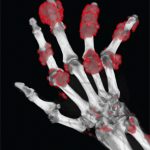ACR CONVERGENCE 2020—Earlier this year, the ACR released an updated guideline for the management of gout, and approximately 50 abstracts of studies on various aspects of gout were accepted for presentation at ACR Convergence 2020. We spoke to Ethan Craig, MD, MHS, associate editor of The Rheumatologist (TR), as well as an assistant professor of clinical medicine with the Division of Rheumatology at the University of Pennsylvania, Philadelphia, and a rheumatologist at the Corporal Michael J. Crescenz VA Medical Center. Dr. Craig talked to TR about his picks:
Abstract L08—Long Term Cardiovascular Safety of Febuxostat and Allopurinol in Patients with Chronic Gout: The Febuxostat versus Allopurinol Streamlined Trial (on Behalf of the FAST Investigators)
Dr. Craig: “The CARES trial, comparing febuxostat to allopurinol in treatment of gout, found an increase in all-cause mortality and cardiovascular mortality among patients treated with febuxostat, compared to allopurinol, leading to an FDA warning. The FAST trial was mandated by the EMA to further investigate this finding. This RCT of 6128 patients with gout over age 60 with at least one cardiovascular risk factor were randomized to either continue baseline treatment with an optimized dose of allopurinol or switch to febuxostat. Contrary to the prior CARES trial, febuxostat was non-inferior to allopurinol for the primary outcome of composite hospitalization for non-fatal MI, non-fatal stroke, or cardiovascular death.”1,2 (See our full report on the FAST trial.)
Dr. Craig: “Pegloticase, a pegylated recombinant uricase, is a potent tool in the gout arsenal. It rapidly lowers uric acid levels and leads to more rapid reduction of tophaceous burden than other urate-lowering therapies. However, its use is limited by high rates of antibody formation, leading to increased risk of infusion reactions and loss of efficacy. ACR Convergence 2020 brought us several trials aimed at investigating the role of concurrent use of oral, small-molecule therapies to reduce this risk of antibody formation.”
Abstract 0952—Reducing Immunogenicity of Pegloticase (RECIPE) with Concomitant Use of Mycophenolate Mofetil in Patients with Refractory Gout—a Phase II Double Blind Randomized Controlled Trial: Short-term concomitant use of mycophenolate mofetil with pegloticase was generally well tolerated in this proof of concept study, according to the researchers. It was associated with a statistically significant and clinically meaningful impact on the proportion of subjects achieving and maintaining a serum uric acid level ≤6 mg/dL at 24 weeks.
Abstract 0677—A Multicenter, Efficacy and Safety Study of Methotrexate to Increase Response Rates in Patients with Uncontrolled Gout Receiving Pegloticase (MIRROR): 12-Month Results of an Open-Label Study: This clinical trial prospectively examined the efficacy and safety of pegloticase in patients with uncontrolled gout who were co-treated with oral methotrexate. The 6-month response rate of methotrexate/pegloticase co-therapy was 78.6%. Responders at month 6 who remained on treatment continued to be responders at month 12 with serum uric acid levels remaining below 1 mg/dL. According to the researchers, the methotrexate/pegloticase co-therapy was well tolerated over this 12-month period with a reduced incidence of gout flares over time.



